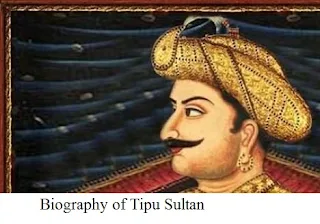Biography of Tipu Sultan
Tipu Sultan (1751-1799) was a prominent ruler and military leader of the Kingdom of Mysore in South India. He was born on November 20, 1751, as the eldest son of Sultan Hyder Ali of Mysore and Fatima Fakhr-un-Nisa. Tipu Sultan is best known for his resistance against British colonialism and his efforts to defend his kingdom against foreign powers during the late 18th century.
 |
| Biography of Tipu Sultan |
Early Life and Ascension:
Tipu Sultan grew up in a military environment, receiving extensive training in warfare, administration, and statesmanship from a young age. He became the ruler of the Kingdom of Mysore in 1782 after his father, Hyder Ali, passed away. At this time, the Mysorean kingdom was facing threats from the British East India Company, the Marathas, and the Nizam of Hyderabad.
Tipu Sultan's Resistance Against British Colonialism:
Tipu Sultan is widely remembered for his fierce resistance against the British East India Company. He engaged in four Anglo-Mysore Wars against the British, attempting to safeguard his kingdom's independence. Notably, he fought against British forces led by notable figures like Lord Cornwallis and Arthur Wellesley (later known as the Duke of Wellington).
In the third Anglo-Mysore War (1790-1792), Tipu Sultan's forces faced a coalition of British and Maratha troops. The conflict ended with the Treaty of Seringapatam in 1792, which significantly reduced Tipu's territories and forced him to pay a large sum as war indemnity.
The Fourth Anglo-Mysore War and Death:
The Fourth Anglo-Mysore War (1798-1799) was Tipu Sultan's final confrontation against the British. In this war, he formed alliances with the French and the Marathas to resist the British forces. However, his capital, Seringapatam (present-day Srirangapatna), fell to the British in May 1799 after a prolonged siege.
During the siege, Tipu Sultan fought bravely but tragically lost his life. He died on May 4, 1799, defending his capital. The circumstances of his death are still a topic of historical debate, with conflicting accounts.
Legacy of Tipu Sultan:
Tipu Sultan is remembered as a valiant warrior, an innovative military strategist, and a strong advocate for his kingdom's independence. He was also a patron of art, culture, and technology. His resistance against British colonialism and his efforts to modernize his kingdom have made him a symbol of Indian nationalism and anti-colonial struggle.
However, opinions about Tipu Sultan remain divided. While he is celebrated by many in India as a freedom fighter, others criticize his methods, including allegations of religious intolerance and forced conversions.
In contemporary India, Tipu Sultan's legacy continues to be a subject of historical and political discourse, reflecting the complexities of his rule and the broader context of his time.